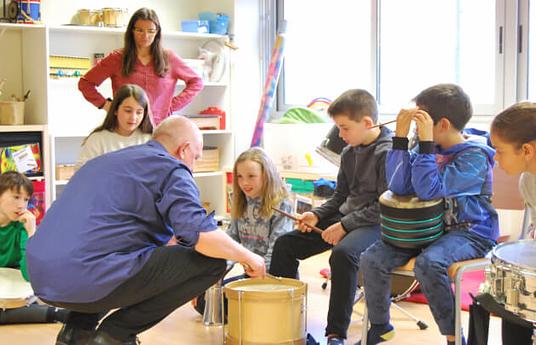What we do?
In the co-design sessions, participants work in groups to design a solution prototype for a specific problem. The methodology used involves a series of rapid exercises that will lead the participants through the process of creation, designing and prototyping. At first, the group starts working with the definition of the problem they want to tackle, understand their causes and consequences. Then, they have to think of possible solutions, considering its impacts and possibilities of realization. The final step is the design of a solution prototype that can be applied to solve the problem.
One of the purposes of these sessions is to bring together people from different backgrounds and with diverse skills, in order to tackle the problem from different angles. This enables the creation of a prototype that incorporates aspects from different spheres, and invites the participants to think outside the box and use their creativity to think of new ideas to tackle one specific issue that their community is facing.
Another key aspect is collaboration and collective creation, because through testing and feedback from others, the group can solve the imperfections of the prototype before its implementation.
At the same time, the sessions are oriented to empower the participants to think of solutions for their local context. The exercises help them to think specific and realizable activities, that are simple to develop, have a major impact and can be replicable in other contexts.
This methodology is used by the Latin America and the Caribbean Hub of Innovation for Change (I4C) to organize Innovation Labs, Hackathons and Campaign Accelerators. Since 2018, the Lac Hub has developed 12 co-design workshops in 12 countries in the region: Argentina, Barbados, Chile, Colombia, Ecuador, El Salvador, Guatemala, Honduras, Jamaica, México, Perú and Dominican Republic.
As an example, in 2018 it organized the First Regional Hackathon for the Prevention of Juvenile Violence in the North Triangle of Central America. The Hackathon was based on the principles of innovation, collaboration, scalability and replicability, using the co-design methodology. After the regional competition, three teams won and implement their projects:
· FlyKey keyboard: development of a personalized keyboard with a library of positive emojis to prevent bullying.
· Tunumen+QI: platform design to contribute to social reinsertion of adolescents that lack freedom and prevent relapse.
· Be Free: platform design to work with women victims of violence or at risk, design to bring advice and service references through a chat box and qualify personnel.
Also, in 2018, Innovation for Change partnered with TECHO International, to launch the campaign Ciudades x Jovenes to provide youth a chance to discuss the ways they experience political and social exclusion and to propose solutions to these challenges. Ciudades x Jóvenes encouraged young people to design the cities of the future by creating open discussions about the challenges youth face in their cities and the solutions they propose to address these challenges. Ciudades x Jóvenes led to the organizing of an event known as the Urban Campus with the theme of “Youth for the Future of Latin American Cities.” One thousand young people from more than nineteen countries in LAC attended and showed their commitment to build the cities of the future.
Why we do it?
Finding solutions to the problems that affect our societies involves changing the way we think and we tackle them. In different spheres people tend to apply the same logic and patrons, that most of the time lead to the same mistakes and the same problems. In times of constant change, like the ones we are facing, the capacity to adapt and be innovative becomes essential.
We believe that new generations have the potential to change their mind set and use their creativity to think of innovative solutions for past issues. Students and young professionals are usually very interested in participating and learning from these experiences, where they can propose new ideas, something that sometimes they find hard to do in traditional institutions.
Through the principles of creativity and innovation we can help young people to be able to turn their ideas into something possible, realizable and replicable. Also, we believe that the best ideas come from collaboration and the best way to tackle similar problems is collectively, incorporating different experiences and using them to build something better.
This methodology is very useful because it can be applied in multiple contexts, to solve different issues. As it is shown in the examples, co-design sessions were used to tackle problems of violence and social development in different countries. It is also a methodology that incorporates values and skills that are needed in the professional world, such as collaboration, communication, diversity, teamwork, creativity, innovation, capacity to solve problems, adaptability, perseverance and think under time pressure.
Latin America is a region that faces great challenges: high levels of inequalities, poverty, violence, corruption, effects of climate change, among others. The actors that were able to solve the problems of the past need to innovate and incorporate new voices in order to face these challenges. In this sense, the participation of the youth is essential to think of new solutions to tackle these issues, specially because they will be the ones in charge of implementing them.



